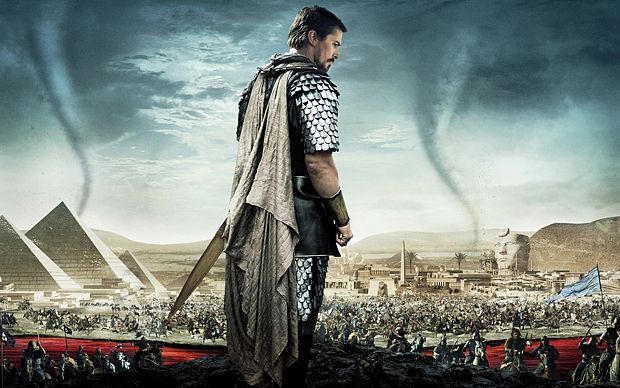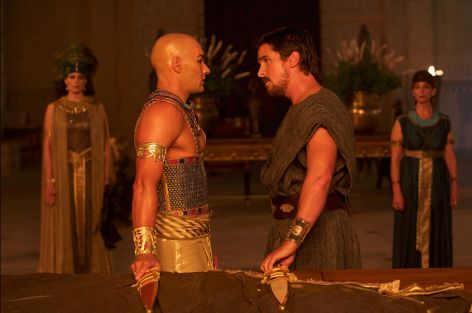Is “Exodus: Gods and Kings” Biblically Accurate?
Ridley Scott’s Exodus is now in theaters, yet it misses many of the important lessons the Exodus account teaches. What should we learn from the real Exodus?

We’ve always enjoyed watching Cecil B. DeMille’s epic 1956 film The Ten Commandments. This film covered the Exodus account; and though not perfect, it respectfully retold the biblical story. Now, nearly 60 years later, another movie about the Exodus is in theaters: Ridley Scott’s Exodus: Gods and Kings. Exodus took the No. 1 spot at the box office in the U.S. this weekend.
1. The conflict between Moses and Pharaoh.
2. The oppression of the Israelites as slaves to Pharaoh’s Egypt.
3. Pharaoh’s defiance in the face of the 10 plagues.
4. The crossing of the Red Sea.
All these events make for good movie scenes—however, the real significance of these themes is not their plot potential, but the lessons they are designed to teach.
These spiritual lessons are missed, and many are even hidden by some glaring inaccuracies in the recent movie!
Is Exodus: Gods and Kings biblically accurate?
Lesson 1: We become slaves of sin if we allow ourselves to dwell with sin
When the Israelites first came to Egypt, they were free and lived in the best district of Egypt (Genesis 47:1-5). But their freedoms were slowly taken away. They eventually became oppressed slaves of the Egyptians (Exodus 1:7-14).
The Bible tells us that the things that happened during the Exodus are lessons we should learn from. But the lessons to be learned won’t be found in the movies!
This was actually an area the movie Exodus did a good job of portraying accurately. The scenes of the Israelites in bondage building the monuments of ancient Egypt were visually striking.
However, the Bible conveys a much deeper spiritual lesson. It likens Egypt to sin, and the Israelites were, in essence, slaves of sin. If we allow ourselves to be part of or even around sinful behavior, it will ultimately affect us (1 Corinthians 15:33). And once sin gets a small grip on us, it will overwhelm and enslave us (John 8:34).
The Exodus teaches us that the Israelites had to leave the shackles of Egypt in order to be truly free. Likewise, Christians must leave the shackles of sin in order to truly be free (Romans 6:14-17).
Lesson 2: Moses chose to leave Egypt
Unlike what both The Ten Commandments and Exodus: Gods and Kings portray, Moses’ ethnic identity as an Israelite was not a secret. Both Scripture and the historian Josephus give us more details about Moses’ birth and upbringing in the Egyptian royal court.
Courtesy of Twentieth Century Fox Film Corporation
God rewarded the faith of Moses’ mother by allowing her to take care of her son until he was perhaps 3 years old (Exodus 2:7-9). The indication is that Moses knew his ethnicity as he was raised in Pharaoh’s court.
Wrestling with his position in Egypt and what he knew to be right, Moses finally decided to stand on principle and forsook the luxuries of Egypt. This led to the situation where Moses, then 40 years old, saw an Egyptian beating an Israelite and avenged his people by killing the Egyptian (Exodus 2:11-12; Acts 7:23-25). After doing this, Moses fled Egypt (Exodus 2:13-15).
The Bible points out the lesson that Moses understood his heritage and chose to follow God instead of enjoying his prestige in Egypt: “By faith Moses, when he became of age, refused to be called the son of Pharaoh’s daughter, choosing rather to suffer affliction with the people of God than to enjoy the passing pleasures of sin” (Hebrews 11:24-26).
Moses chose to leave Egypt—he was not exiled by Pharaoh (as both movies portray).
Lesson 3: Moses’ real relationship with God was one of humility
One of the most egregious errors in the new movie is the portrayal of Moses’ relationship with “God” (or God’s messenger). In the movie, “God” is irreverently portrayed by a dirty (literally), petulant, prepubescent boy. Not only is God incorrectly portrayed, but Moses’ relationship with “God” is sometimes adversarial. Moses often questions “God’s” decisions and judgment.
The real Moses was taught humility in a unique way—by spending 40 years as a shepherd in the wilderness
This error veils a major theme of the true Exodus story: Moses’ example of humility. The movie neglects to record Moses’ real response to God’s commission: “Who am I that I should go to Pharaoh?” (Exodus 3:11).
The real Moses was taught humility in a unique way (also not captured in the movie)—by spending 40 years as a shepherd in the wilderness (after spending the first 40 years of his life as a part of the royal family of Egypt). Moses is called the most humble man on earth during his lifetime (Numbers 12:3).
Unlike Moses, Pharaoh demonstrated prideful defiance toward God. Even after seven plagues, God asked Pharaoh through Moses, “How long will you refuse to humble yourself before Me?” (Exodus 10:3). The recent movie totally misses this and portrays Pharaoh as a gentle father and a leader mainly concerned for the economic well-being of his nation.
The great lesson is that Moses was used by God because he humbled himself and submitted to God. The lesson for you and me today is that we can be successful and free only when we humble ourselves under God’s authority (James 4:7).
That is a lesson you won’t get from Christian Bale’s Moses!
Lesson 4: The Red Sea crossing was a miracle
Perhaps the most dramatic part of the Exodus is the parting of the Red Sea. The movie inaccurately implies that the Red Sea parted as a result of a meteor hitting the earth. It also shows the Israelites beginning the crossing by wading in water that slowly receded back.
The Israelites had found themselves trapped—with a sea in front and a pursuing army behind. There was no possibility of physical escape or defeating the mighty Egyptian army militarily.
Only God could save them.
Likewise, human beings can only be saved from sin’s penalty—death—through God. Just as ancient Israel was “baptized” and began a new life after they crossed the Red Sea, you can begin a new spiritual life at repentance and baptism (1 Corinthians 10:1-3; Acts 2:38; Ephesians 4:17-24).
Important lessons
Yes, the Bible tells us that the things that happened during the Exodus are lessons we should learn from (1 Corinthians 10:11). But the lessons to be learned won’t be found in the movies.
No, the lessons are found in the pages of the Bible.
We urge our readers to closely read the Exodus account (Exodus 1-14) before and after seeing the movie (if you decide to see it). We gave a similar recommendation when we wrote about the Noah movie this past spring.
Exodus: Gods and Kings may be entertaining for some, but it is not biblically accurate.
Date Posted: December 17, 2014

